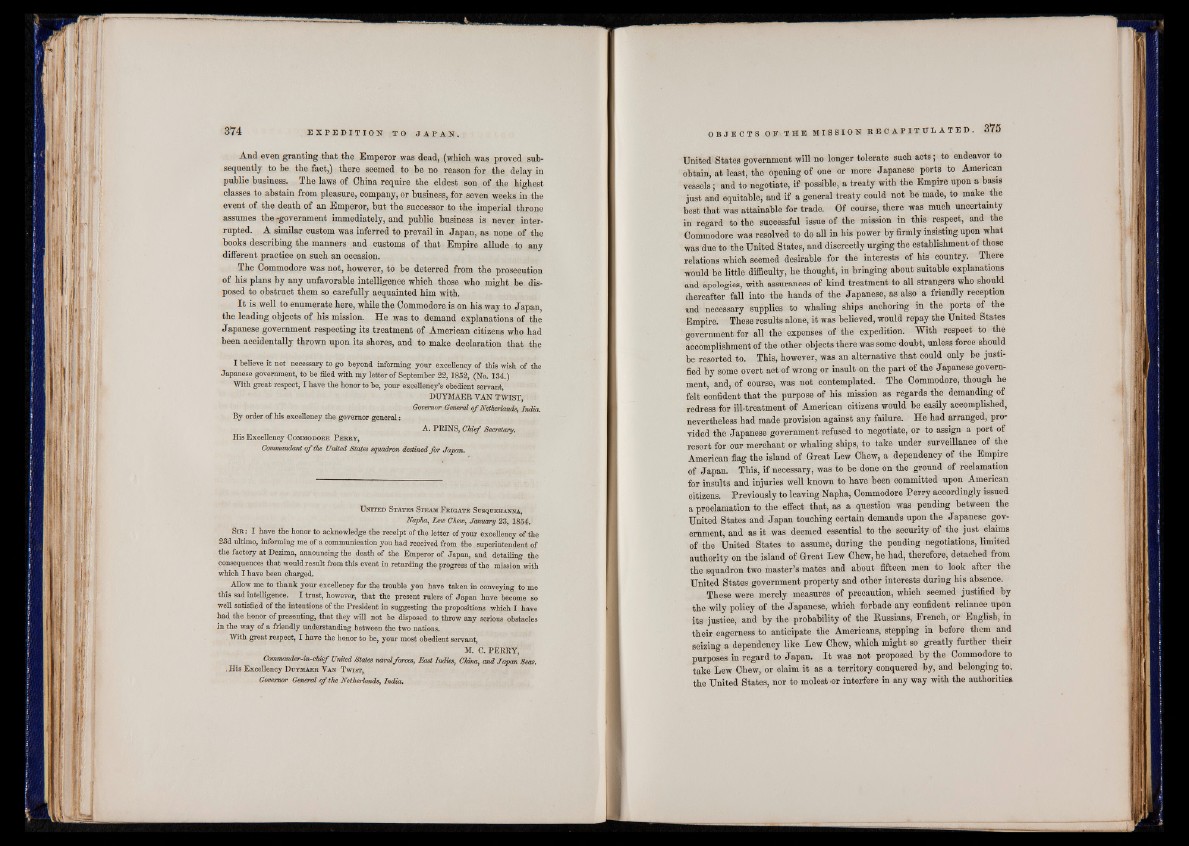
And even granting that the Emperor was dead, (which was proved subsequently
to he the fact,) there seemed to he no reason for the delay in
public business. The laws of China require the eldest son of the highest
classes to abstain from pleasure, company, or business, for seven weeks in the
event of the death of an Emperor, but the successor to the imperial throne
assumes the-government immediately, and public business is never interrupted.
A similar custom was inferred to prevail in Japan, as none of the
hooks describing the manners and customs of that Empire allude to any
different practice on such an occasion.
The Commodore was not, however, to be deterred from the prosecution
of his plans by any unfavorable intelligence which those who might be disposed
to obstruct them so carefully acquainted him with.
I t is well to enumerate here, while the Commodore is on his way to Japan,
the leading objects of his mission. He was to demand explanations of the
Japanese government respecting its treatment of American citizens who had
been accidentally thrown upon its shores, and to make declaration that the
I believe it not necessary to go beyond informing your excellency of this wish of the
Japanese government, to be filed with my letter of September 22, 1852, (No. 134.)
With great respect, I have the honor to be, your excellency’s obedient servant,
DUYMAER VAN TWIST,
Governor General o f Netherlands, India.
By order of his excellency the governor general:
A. PRINS, Chief Secretary.
His Excellency Commodore P erry ,
Commandant o f the United States squadron destined fo r Japan.
United States St eam F r ig ate Susquehanna,
Napha, Lew Chewt January 23, 1854.
Sir : I have the honor to acknowledge the receipt of the letter of your excellency of the
23d ultimo, informing me of a communication you had received from the superintendent of
the factory at Dezima, announcing the death of the Emperor of Japan, and detailing the
consequences that would result from this event in retarding the progress of the mission with
which I have been charged.
Allow me to thank your excellency for the trouble you have taken in conveying to me
this sad intelligence. I trust, however, that the present rulers of Japan have become so
well satisfied of the intentions of the President in suggesting the propositions which I have
had the honor of presenting, that they will not be disposed to throw any serious obstacles
in the way of a friendly understanding between the two nations.
With great respect, I have the honor to be, your most obedient servant,
M. C. PERRY,
Comma/nder-in-chief United States mval forces, East Indies, China, and Japan Seas.
.His Excellency D uymaer Van T wist,
Governor General o f the Netherlands, India.
United States government will no longer tolerate such acts; to endeavor to
obtain, at least, the opening of one or more Japanese ports to American
vessels; and to negotiate, if possible, a treaty with the Empire upon a basis
just and equitable, and if a general treaty could not be made, to make the
best that was attainable for trade. Of course, there was much uncertainty
in regard to the successful issue of the mission in this respect, and the
Commodore was resolved to do all in his power by firmly insisting upon what
was due to the United States, and discreetly urging the establishment of those
relations which seemed desirable for the interests of his country. There
would be little difficulty, he thought, in bringing about suitable explanations
and apologies, with assurances of kind treatment to all strangers who should
thereafter fall into the hands of the Japanese, as also a friendly reception
and necessary supplies to whaling ships anchoring in the ports of the
Empire. These results alone, it was believed, would repay the United States
government for all the expenses of the expedition. With respect to the
accomplishment of the other objects there was some doubt, unless force should
be resorted to. This, however, was an alternative that could only be justified
by some overt act of wrong or insult on the part of the Japanese government,
and, of course, was not contemplated. The Commodore, though he
felt confident that the purpose of his mission as regards the demanding of
redress for ill-treatment of American citizens would be easily accomplished,
nevertheless had made provision against any failure. He had arranged, provided
the Japanese government refused to negotiate, or to assign a port of
resort for our merchant or whaling ships, to take under surveillance of the
American flag the island of Great Lew Chew, a dependency of the Empire
of Japan. This, if necessary, was to be done on the ground of reclamation
for insults and injuries well known to have been committed upon American
citizens. Previously to leaving Napha, Commodore Perry accordingly issued
a proclamation to the effect that, as a question was pending between the
United States and Japan touching certain demands upon the Japanese government,
and as it was deemed essential to the security of the just claims
of the United States to assume, during the pending negotiations, limited
authority on the island of Great Lew Chew, he had, therefore, detached from
the squadron two master’s mates and about fifteen men to look after the
United States government property and other interests during his absence.
These were merely measures of precaution, which seemed justified by
the wily policy of the Japanese, which forbade any confident reliance upon
its justice, and by the probability of the Bussians, French, or English, in
their eagerness to anticipate the Americans, stepping in before them and
seizing a dependency like Lew Chew, which might so greatly further their
purposes in regard to Japan. I t was not proposed by the Commodore to
take Lew Chew, or claim it as a territory conquered by, and belonging to,
the United States, nor to molest nr interfere in any way with the authorities